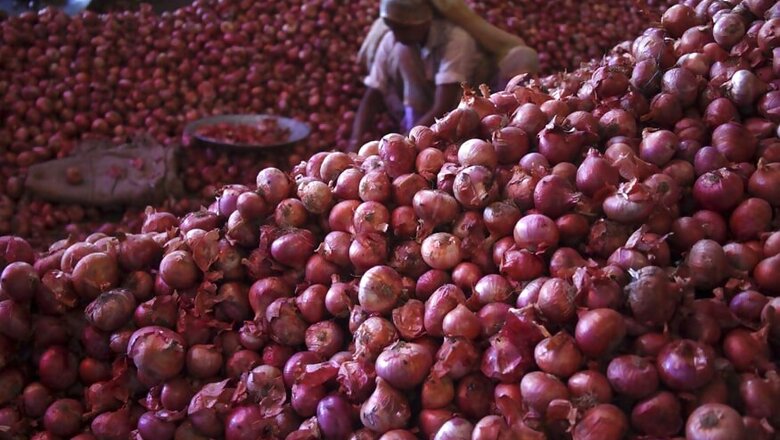
views
New Delhi: In a welcome move, the Centre on Tuesday said the onions will now be sold for Rs 22 per kg as it has imported around 18 tonnes of kitchen staple. The announcement came a day after government data revealed that retail inflation rose to about five-and-half year high of 7.35 per cent in December 2019, surpassing the RBI's comfort level.
"Around 18,000 ton onion has been imported now, but even after all the efforts, only 2000 tonnes onion has been sold. We are providing onions at Rs 22/kg now," news agency ANI quoted Ram Vilas Paswan, Union Minister of Consumer Affairs, as saying.
Last year, onion prices in most cities, were ruling at Rs 100/kg. "Imported onions have started arriving. About 1,160 tonne has reached India. Additional 10,560 tonne of shipments are expected to arrive in the next 3-4 days," a senior ministry official had said. Both red and yellow onions were imported from Turkey, Egypt and Afghanistan. The shipments are landing at Mumbai port, the official had said in December.
The minister further said the Centre is offering imported onions at an average landed cost of Rs 55 per kg and also bearing the entire transportation cost. Despite all, the state governments are not coming forward to buy and retail it.
Asked why prices are still high despite imports, Paswan said, "The imports are being done to improve the domestic supply and check prices. If state governments are not ready to take the imported onions, what can we do?"
So far, Andhra Pradesh, Kerala, Telangana, Uttar Pradesh and West Bengal governments have taken the imported onions. Many states have withdrawn their demand, he added. Sources said the taste of imported onions is different from the homegrown ones and consumers are not buying it in the retail markets when domestic onion is available at the same rate.
Meanwhile, on Tuesday, the wholesale prices-based inflation surged to an eight-month high of 2.59 per cent in December, as against 0.58 per cent in November due to sharp rise in prices of food articles like onion and potato.
A government data stated that the annual inflation, based on monthly wholesale price index (WPI) was recorded at 3.24 per cent in April 2019. WPI was at 3.46 per cent during December 2018.
Build up inflation rate in the financial year so far was 2.42 per cent compared to a build up rate of 2.92 per cent in the corresponding period of the previous year, as per data released by the Office of Economic Adviser, Ministry of Commerce & Industry on Tuesday.
The rate of price rise for food articles rose to 13.12 per cent during December as against 11 per cent a month earlier, while for non-food articles it rose nearly four-fold to 7.72 per cent from 1.93 per cent in November.
Among food articles, vegetable prices surged by 69.69 per cent mainly on account of onion, which witnessed 455.83 per cent jump in prices, followed by potato at 44.97 per cent.
Onion prices ruled above Rs 100 per kg in various markets till recently because of crop damage due to excessive rains. However, prices have started to move southwards with fresh crop arrival and imports.
The consumer price index (CPI) based retail inflation, as per data released on Monday, spiked to over a 5-year high of 7.35 per cent in December due to costlier food products. The unexpected jump in inflation diminished the chances of the RBI cutting interest rate at its next monetary policy review due in early February.
Experts feel CPI is expected to further harden next month due to elevated price level of food prices mainly vegetables. "We now expect inflation to breach 8 per cent in January and then start bottoming out. However, this jump in inflation will perforce the RBI to relook at the inflation trajectory but in our view any change to a possible change in stance could be unwarranted as we find compelling evidence of significant slowdown in discretionary consumption," SBI Economic Research Department said in a report.
It further said RBI missed the bus in cutting rates in December and if food prices remain elevated, there is a fear of economy slipping into stagflation, which indicates low growth and high inflation. This means RBI will possibly remain on hold in 2020, going by current trends.
(With PTI inputs)


















Comments
0 comment